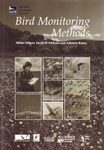![Bird Conservation and Agriculture Bird Conservation and Agriculture]()
Click to have a closer look
About this book
Contents
Customer reviews
Biography
Related titles
About this book
Writing for researchers, professionals and graduate students, the authors summarize the collapse of populations of many farmland bird species in the 20th century, one of the biggest conservation problems of the day.
They firstly set the historical context of change in agriculture and bird communities since the 18th century, and introduce the bird communities of agricultural land today. They then provide an overview of this very active area of applied conservation science, including in-depth case studies of 16 species that, taken together, illustrate the many ways that agricultural intensification has affected bird populations. Moreover, they show how this evidence base, coupled with recent greening of agriculture policy, has provided opportunities to manage agricultural land to better integrate the needs of food production and bird conservation. They conclude by looking forward to challenges that the conservation of bird populations on agricultural land is likely to face in the near future.
Contents
Introduction: birds and agriculture in Britain; 1. The history of agriculture in Britain; Part I. The Habitats and Their Birds: 2. The field; 3. The field boundary; 4. Semi-natural heathlands and grasslands; Part II. Trends and Patterns: 5. Bird population trends; 6. Patterns of association between agricultural change and wildlife populations; Part III. The Effects of Agricultural Change on Birds: 7. Large-scale studies of abundance, distribution and demograph; 8. Species case studies; 9. Studies of changing agricultural practice; 10. What future for birds and agriculture in Britain?
Customer Reviews
Biography
Jeremy D. Wilson is Head of Research for RSPB Scotland. He has worked as a Royal 1851 Commission Fellow on the role of dispersal in population dynamics of Dippers, and led a research study of the consequences of organic farming for bird populations for the British Trust for Ornithology. He is an Editor for the British Ornithologists' Union journal, Ibis, and an Associate Editor of the British Ecological Society's Journal of Applied Ecology. Andrew D. Evans joined the RSPB as a field biologist in 1988, studying the reasons behind the near extinction of the cirl bunting in the UK. This put him at the forefront of the unfolding story of bird population declines as a result of agricultural intensification. He is currently Head of Species Recovery at the RSPB. Philip V. Grice has worked professionally as an ornithologist in the government's nature conservation bodies since 1991, and is now a Senior Specialist in ornithology at Natural England. He has worked on a broad range of bird conservation issues but has become increasingly concerned with addressing the declines in farmland birds since the mid-1990s.
By: Jeremy D Wilson, Andrew D Evans and Philip V Grice
394 pages, Figs, tabs, halftones
'... important textbook ... exemplary ... The material is presented very clearly in tables and figures, supported by photos and delightful line drawings.' Bulletin of the British Ecological Society 'The text is clearly crafted throughout, with good use of figures and tables and some nice additional touches. For example, the evocative description of the UK farmed landscape from the air in the opening section is, dare I say it, almost poetic! ... Overall, it is an excellent text, which, in my case, will soon become well thumbed and photocopied for use as lecture material. Birdwatchers will find much of interest in the mixture of avian natural history and applied conservation science.' IBIS 'With almost 1,000 references the book provides an exhaustive compendium of current knowledge. I found it a telling catalogue of both the power and the limitations of science ... for those looking for a thorough summary of what is known about conserving birds in British farmland Bird Conservation and Agriculture will be an important reference.' Oryx

























![Ageing & Sexing of Migratory East Asian Passerines [English / Chinese]](http://mediacdn.nhbs.com/jackets/jackets_resizer_medium/25/250760.jpg?height=150&width=115)




















